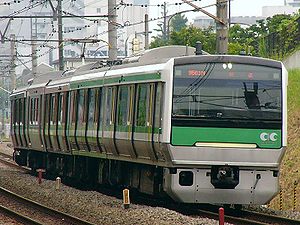|
E993 series
The E993 series (E993系) "AC Train" was an experimental 5-car electric multiple unit (EMU) train operated by East Japan Railway Company (JR East) in Japan between 2002 and 2006.[1][2] ConceptThe E993 series "AC Train" ("Advanced Commuter Train") was developed by JR East to test and evaluate a number of new technologies and features for possible use in future commuter train designs.[1] These included features intended to reduce life-cycle costs, improve the interior passenger environment, improve accessibility, and increase environmental friendliness.[2] Technological featuresThe train incorporated the following features for evaluation.[2]
FormationThe 5-car articulated set was based at Kawagoe Depot on the Kawagoe Line and formed as shown below, with car 1 at the Kawagoe end, and car 5 at the Shinjuku end.[3] Cars 1 and 2 were built by Kawasaki Heavy Industries in Kobe, and cars 3 to 5 were built by Tokyu Car Corporation in Yokohama.[2]
Cars 2 and 4 were each fitted with one single-arm pantograph.[3] Cars 1 and 2 had double-skin aluminium bodies, cars 3 to 5 had stainless steel bodies with double-skin construction used for cars 3 and 5.[2]
History The train was delivered to JR East's Kawagoe Depot on 17 January 2002.[2] Test running commenced on the Kawagoe Line and Saikyo Line the following month.[2] The train was officially withdrawn on 14 July 2006.[4] No cars are preserved. Features tested on the E993 series, including articulated cars and direct drive motors, were subsequently incorporated in the E331 series prototype train delivered in 2006. ReferencesWikimedia Commons has media related to E993 series.
|
||||||||||||||||||||||||||||||||||||||||||||||||||||||||||||||||||





